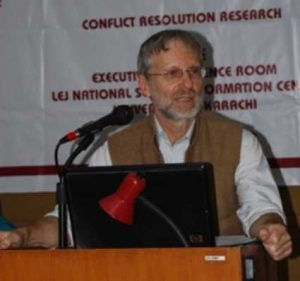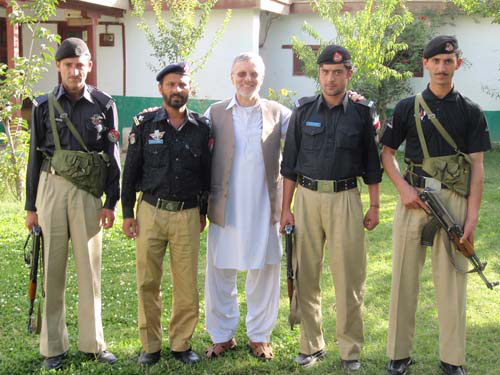September 29, 2010
By Kevin Burns

Lecture at Karachi University on Conflict Resolution
There’s a direct link between Canada’s 1976 Olympic water polo team and Canada’s participation in development initiatives in one of the most troubled areas of today’s Pakistan. That link is Ivan Somlai. When Canada hosted the twenty-first Olympiad in Montreal, the water polo team was managed by a recent arrival from Hungary.
Now, of course, there’s always an intricate web of Canadian-Hungarian connections anytime the subject of water polo breaks the surface. Before continuing the Somlai story, here’s the Csepregi connection: Gabor Csepregi, now Vice-President (Teaching and Research) at the Collège Universitaire St Boniface, was in fact the captain of that Olympic water polo team. (see appointment of Gabor Csepregi and his biography for more details)
As for Somlai, it seemed as if this young athlete was going to follow a career as a mountaineer or as a sports educator.
Soon, however, perhaps interpreting the Olympic motto of “Citius, Altius, Fortius” in a particularly innovative way, Ivan Somlai chose to follow quite a different path. He substituted international competition with international development. Not content with a solely academic approach to development, Ivan Somlai found a way to straddle the world of scholarly research and teaching at the university level, with the challenges of project management and implementation at the grass-roots level.
Although affiliated with various universities (including the University of Calgary, Thompson Rivers University, and the University of Victoria) Ivan Somlai has now worked in some thirty different countries while involving himself with more than fifty international projects. These have addressed issues of education, natural resources, health, management, technical trades, and tourism. Much of this work has been carried out with the support of CIDA, World Bank, Asian Development Bank, international foundations, and various private companies.
In Nepal, he worked with the Ministry of Health on the delivery of local services and doctor training. In Indonesia, he switched his focus to conflict resolution over land use practices. And in Chile he worked with various government and non-government agencies on the development of tourism initiatives involving indigenous peoples.
His international work also includes the European community. In Slovakia, for example, he worked on a project with the Roma community, looking into governance issues and how a large but disadvantaged minority group might attain equitable access to social and municipal services.
Since 2008, Ivan Somlai has been living and working in one of the most troubled spots in the world, managing what is Canada’s largest aid project in Pakistan. From a base in Peshawar, he is working with local and regional government to help them improve governance. He’s also working with them on the delivery of effective primary education, basic health and community-managed water supplies in the remote areas of northern Pakistan such as Khyber Pakhtunkhwa Province, once known as the North-West Frontier.

Ivan Somlai with four of his six-member protection squad of Frontier Corp Commandos in the volatile Swat District
Whether it’s through the University of Victoria’s Centre for Asia Pacific Initiatives or Global Collaboration, the consulting company he set up in 2006, Ivan Somlai says his central focus the support of ongoing development of social equity and the promotion of effective methods of alternative conflict mitigation or resolution. In a sense, he is exploring those three keywords at the heart of the Olympic movement. This time, instead of training elite athletes to win in the pool, he now works with disadvantaged communities as they seek swifter means to reach higher than their present circumstances, and use education to become stronger through cooperation.
For more information on Ivan and the development work he has done and is doing now, please visit his website at: http://ethnobureaucratica.weebly.com/
